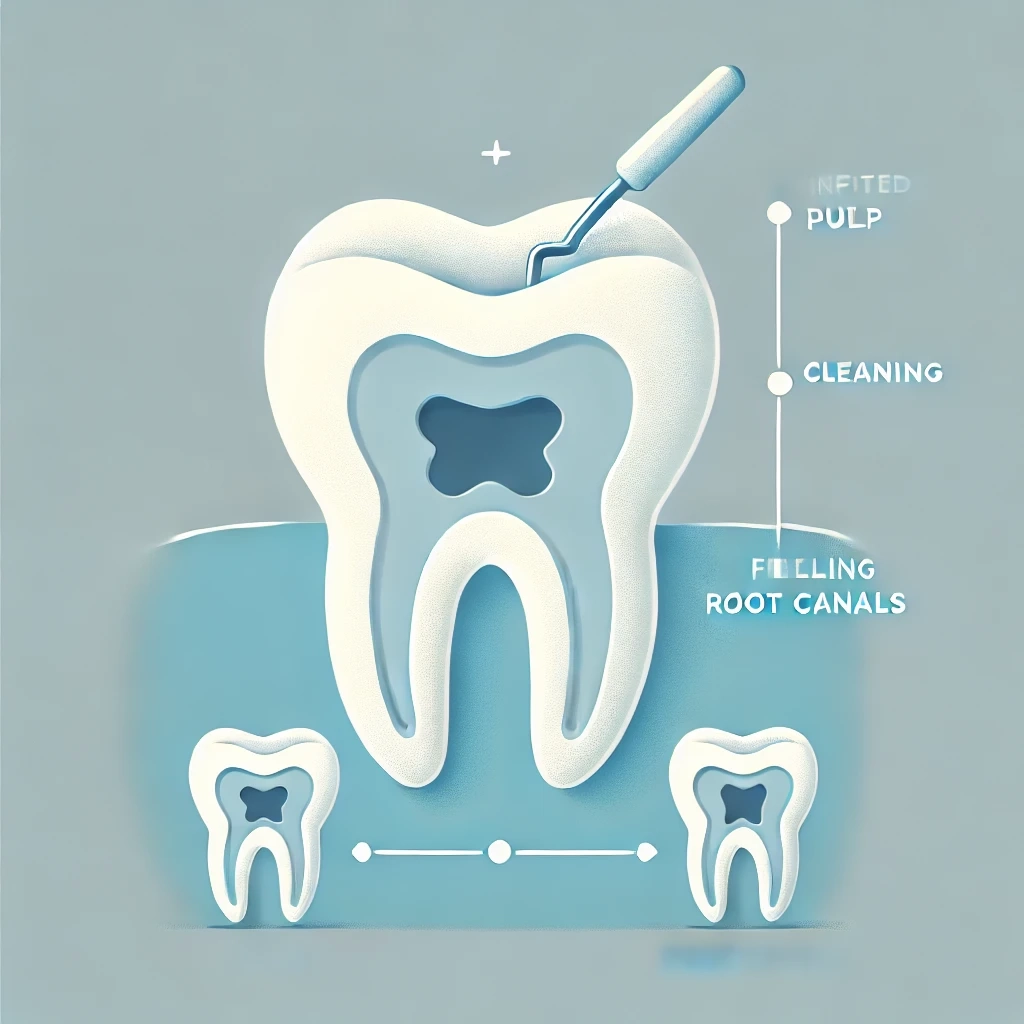Saving damaged teeth by cleaning and repairing root canals


Q&A
When the pulp of a tooth is damaged due to deep decay, a crack, or infection. Symptoms include severe pain, sensitivity to heat and cold, and swelling around the tooth.
Yes, a root canal can last for years if properly cared for. Using a crown after a root canal can extend the life of the tooth.
Root canal treatment is usually performed in one to two sessions, each lasting about 60 to 90 minutes. The duration depends on the complexity and number of canals in the tooth.
After treatment, avoid eating hard foods, maintain oral hygiene, and visit your dentist for checkups on time as recommended.
The cost of root canal treatment varies depending on the type of tooth (anterior or molar), the number of canals, and the complexity of the treatment. In many cases, root canal treatment costs less than tooth replacement.
Yes, a crown is usually recommended after root canal treatment to protect the tooth structure and prevent fractures, especially for back teeth.
Economic
More than 25 years
Very limited
2 to 3 days
A beautiful smile, our gift to you.
Root canal therapy, also known as root canal treatment, is a vital dental procedure that helps save damaged teeth and prevent serious infections. You may need this treatment if you are experiencing severe tooth pain, sensitivity, or swelling. In this comprehensive article, we will cover all aspects of root canal therapy, from the causes and symptoms to the treatment steps and aftercare.
Root canal therapy is a procedure performed to treat infection or damage to the pulp of a tooth. The pulp of a tooth consists of nerves, blood vessels, and cells that are located within the root canals. In cases of damage or infection of the pulp, root canal therapy is performed to prevent further infection and preserve the natural structure of the tooth.

Signs that may lead you to nerve removal include:
Diagnosis and examination: First, the dentist assesses the extent of tooth damage through a clinical examination and using radiographic images.
Local anesthesia: For the patient’s comfort, the tooth and its surroundings are numbed.
Creating access to the canals: The dentist gains access to the pulp and canals by creating a small hole in the crown of the tooth.
Cleaning the canals: Using specialized instruments, damaged pulp and infected tissues are removed from the canals.
Shaping the canals: The canals are prepared in such a way that the filling material completely covers them.
Filling the canals: The canals are filled with special materials (such as gutta-percha) to prevent bacteria from re-entering.
Dental bonding: If necessary, the tooth crown is covered with restorative materials or veneers.
One of the most common questions patients have is whether nerve ablation is painful. With advances in technology and the use of local anesthetics, this treatment is usually painless. However, there may be some sensitivity after the treatment, which can be controlled with painkillers.
To preserve the treated tooth and prevent future problems, it is essential to follow these tips:
The cost of a nerve root extraction varies depending on various factors, including:
Yes, in most cases, a root canaled tooth will require a crown. This is done to increase the strength of the tooth and prevent breakage, especially for back teeth that are more susceptible to pressure.
Although root canal therapy is a safe and effective procedure, some problems may occur:
Sometimes patients hesitate between root canal treatment and tooth extraction. Root canal treatment helps preserve the natural tooth, while tooth extraction requires replacement with an implant or bridge, which is more expensive and time-consuming.
| Feature | Root canal treatment Tooth | extraction |
|---|---|---|
| Preserving natural teeth | yes | no |
| cost | average | Variable cost |
| Treatment time | shorter | longer (with tooth replacement) |
Root canal therapy is a vital way to preserve your natural teeth and prevent serious oral problems. Using modern techniques and the expertise of your dentist, this treatment is often painless and provides lasting results. With proper aftercare and regular visits to your dentist, you can enjoy healthy teeth for many years to come.
If you have any questions about root canal treatment or need advice, contact our dental clinic. Our professional team is ready to answer your questions.
Send us the information and context in which we can help you so that we can contact you as soon as possible.